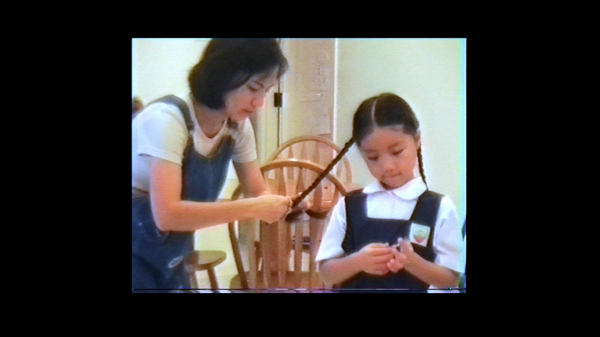
To make “The Feeling of Being Close to You,” Goh used home videos shot on VHS, and recorded moments from their life in New York in scenes that often mirror the events in the archival film.
“I dreamt you wanted to hug me,” the filmmaker Ash Goh Hua murmurs, over a black screen. “O.K.,” their mother replies; her voice, on the other end of a phone call, is distant. “When you hugged me in the dream, I felt like I was suffocating.” “O.K.”
The screen brightens. In Goh’s documentary “The Feeling of Being Close to You,” we first see Goh as a small child, toddling toward their mother in a kitchen and laughing hard. It’s an ordinary moment of joy for a young family. But Goh’s dream casts a shadow over the home video. The rest of the film unfolds through a series of shaky VHS clips and emotionally charged phone conversations, mostly in Mandarin, between Goh and their mother. Their dialogue pushes and pulls at ideas of proximity and distance, intimacy and smothering. The pair discuss parental expectations, Goh’s childhood memories, and a threat of violence as Goh works to understand the distance that has characterized their relationship, and searches for a way to heal.
The New Yorker Documentary
View the latest or submit your own film.

Goh lives in New York and grew up in Singapore, where their mother still lives. “I think we were only able to have this conversation for the first time because we weren’t in the same place,” Goh told me. Because they were in different time zones, their calls took place when it was evening for one and morning for the other, and Goh thinks that something about that asymmetry also helped the two of them to be more open. In total, Goh spent around two years making the film—they and their mother often waited months after a call to feel ready to record the next.
The geographical distance between Goh and their mother is embodied by the crackly audio of the film’s conversations. There is a sense of distance, too, in the video components, between the Goh we see as a giggling child, in home movies shot on VHS and digitized by Goh’s father, and of Goh as an adult, animated and perceptive. To make the film, Goh recorded moments from their life in New York, also on VHS, in scenes that often mirror the events in the archival home videos. The three-year-old Goh struggles to blow out birthday candles; grownup Goh and friends gather around a cake. Goh’s mother braids their hair for school; Goh braids their own hair, tattooed fingers darting in front of the camera. The distance between young Goh and adult Goh seems to shrink. “I was thinking about collapsing time and reëntering the past,” Goh, who’s now twenty-nine, told me. “To invoke a writing of my own history, now, by myself, within the same format.”
The phone conversations touch on topics of increasing depth and intensity: intergenerational trauma and abuse, the meaning of motherhood. “I want to travel with you. I want to give you happiness,” Goh’s mother says at one point in the film, and Goh replies, “I don’t think that’s what I need, Mum.” There are no easy answers, something Goh’s film acknowledges over and over. “I think maybe the reason why people connect to my film is because it doesn’t really present this, like, neat, bow-tied resolution on a difficult relationship,” Goh told me. “It feels kind of soupy, but it’s O.K.”
Sourse: newyorker.com






